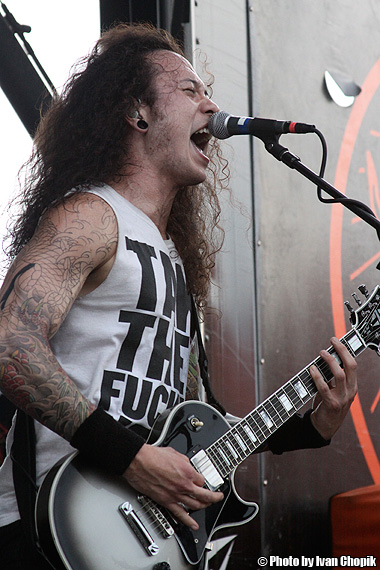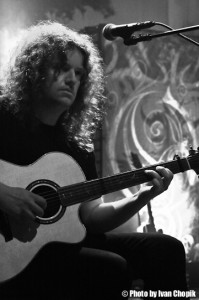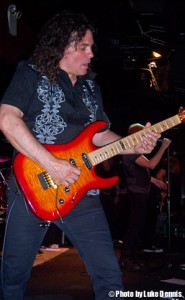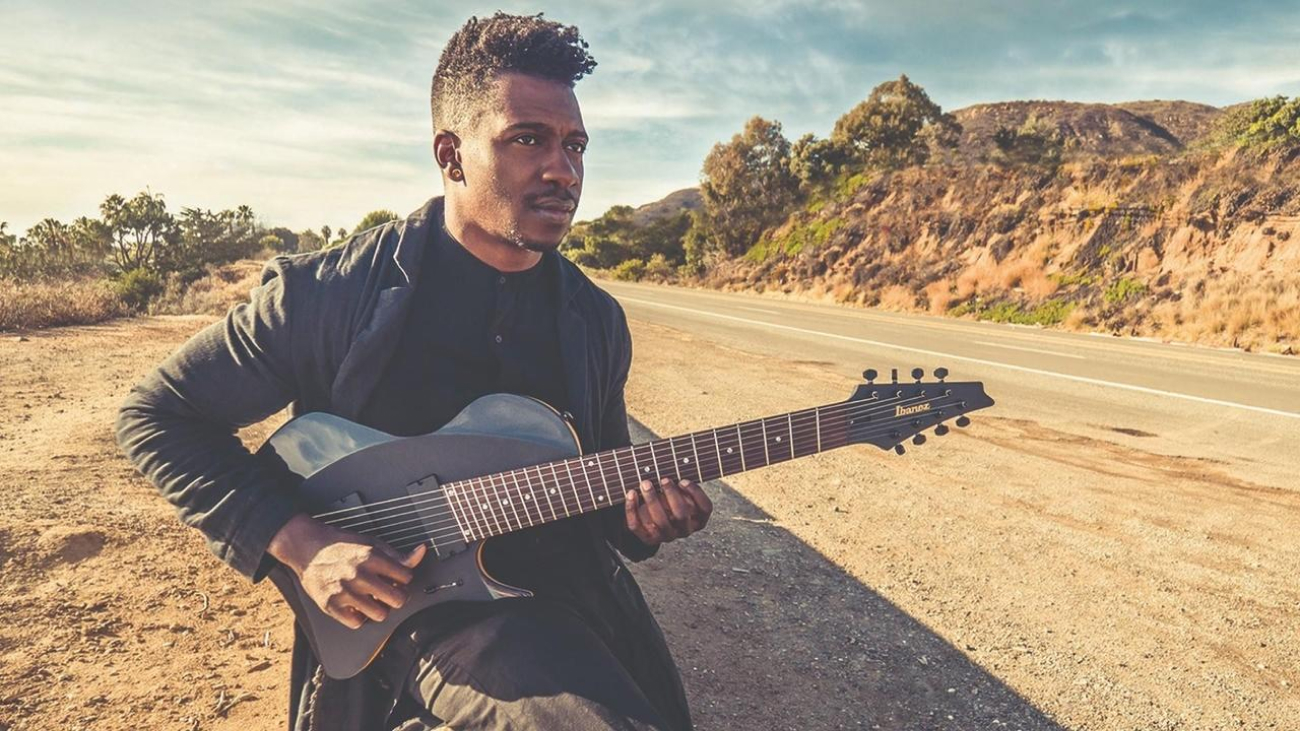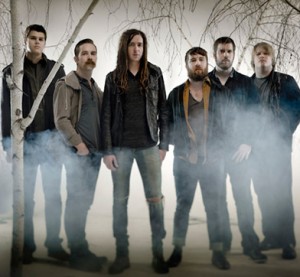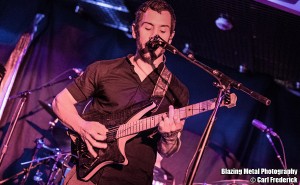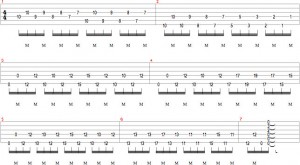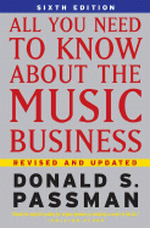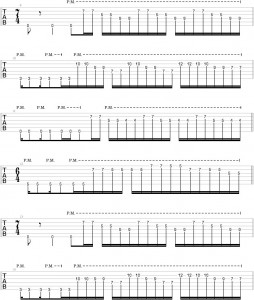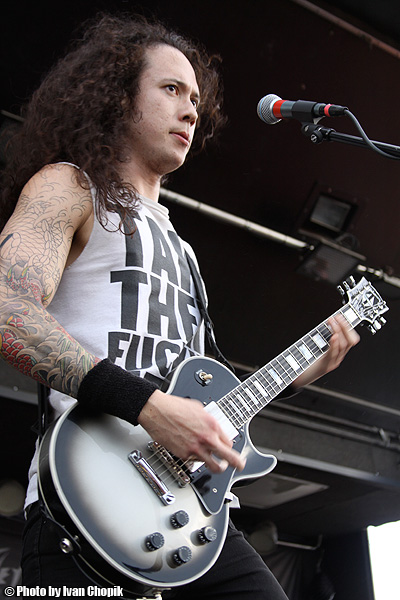 Matt Heafy was born on January 26, 1986 in Iwakuni, Japan and is best known as the lead vocalist and guitarist for the Orlando, Florida based metal quartet Trivium. Trivium formed in 1999 and since their inception have released 4 studio albums and consistently expanded their following with high-profile festivals and tours such as the Download Festival and Ozzfest.
Matt Heafy was born on January 26, 1986 in Iwakuni, Japan and is best known as the lead vocalist and guitarist for the Orlando, Florida based metal quartet Trivium. Trivium formed in 1999 and since their inception have released 4 studio albums and consistently expanded their following with high-profile festivals and tours such as the Download Festival and Ozzfest.
In 2008 the band released Shogun, an album that defines Trivium’s distinctive brand of metal more than ever before. The album’s opening track “Kirisute Gomen” appropriately sets the tone for the record – Matt explains the song’s title as being “an ancient Samurai code that basically meant that if you angered a Samurai or pissed them off, they’d have to chop your head off.”
I had the opportunity to speak with Matt in West Palm Beach, Florida, at one of the final dates of the 2009 Mayhem Fest:
IC: How are you doing, man?
MH: I’m doing excellent, man. It’s a little ridiculously hot. Then again, Arizona was 115 degrees with absurd humidity – we’re from here, so I definitely sing better with humidity, but everything else is kinda difficult.
IC: Do you have any of your home crowd out here, or is that more in North Florida?
MH: Travis, Corey and I all grew up in Altamonte Springs near Orlando, but Paolo grew up in Fort Lauderdale, so I’m sure it’ll be his day today. Our day was kinda yesterday, being in Tampa and all, but it was still about two hours away from anyone we knew.
IC: How has Mayhem Fest been treating you guys?
MH: It’s the best tour we’ve ever been on – the most fun, without a doubt. Every single day’s been really fun. It’s definitely grueling and all that. Coming into it, we didn’t know what it was going to be like, because we’ve been on all of the summer festivals before, and some of them are fun, and some of them are shot – some of them suck, some of them are okay; but this one’s fun, man.
With this one there’s different parties – every once in a while, we get to throw a party. Every band picks a party night. We threw one where it was like a dance party, and we made like ten gallons of booze, this jungle juice shit, and we just had dance music, and like 300 people from the tour showed up. Not even people from the crowd, but like people on the tour and staff and all that stuff – even though we don’t have that many people. There were 300 people there, so I don’t know who the other people were.
The Mayhem crew is amazing, all of the people that work with the tour and for the tour have been treating us incredibly well, all the bands get along great – I’d say across everyone on the tour, maybe 75% of everyone hangs out, which is amazing. I didn’t know tours like this even existed, I didn’t know they were like this – it’s really cool. I pretty much know everybody on the tour, bands and staff alike. It’s a good thing, man.
IC: Would you say that any of the Mayhem Fest shows have topped the Download Festival performance that often gets credited for launching Trivium to the worldwide level?
| Trivium @ Download Festival 2005 |
MH: The 2005 one… Obviously I’m not a drug addict anymore, but we were all coked out of our heads, basically, from a couple of nights previous. So I don’t even remember that day, and that show was the biggest Trivium show ever of our lives. Basically to backtrack to what I was saying, we’re coked out of our heads, we’re across the border of Amsterdam. We’re supposed to be playing the fifth stage at Download, but due to the good things going on, we were bumped up from the fifth stage to the main stage, and we’re supposed to open up at eleven AM. We were told that maybe 10,000 people would be there, so we’re like ‘Holy Shit! We’ve never played in front of more than 2,000.’
And so we’re across the border, and we had all of this blow that we had to get rid of – normally I mask it, but it’s too early [laughs]. So we had to blow through all of that, so we went through all of that stuff, line upon line, and we were all jumping around on the bus going ‘Ah, we’ve got this big show coming up! Wait a second, it’s five AM, the show’s coming up the next day…’ So we all smoked a bunch of weed and drank a bunch to try to fall back asleep, and then there I was laying, just totally tripped off of my head inside my bunk, freaking out. I was like ‘Fuck! I need to go to bed, I need to go to bed.’
So the whole next day we were zombies. Then come the day of the Download show, we woke up and all of our guitars had just been strung before we were about to go on, it was ten degrees out, my nose was still bleeding, my voice sounded like shit – and that’s when I was still wearing chick pants. I don’t anymore. People still think I wear that, because I used to wear chick pants back in the day, because they didn’t make dude pants tight enough. But that’s when I started getting bigger, so they weren’t quite fitting, and I had a muffin top going on, my ankles were showing through the pants because I was getting too tall, my hair looked like shit…
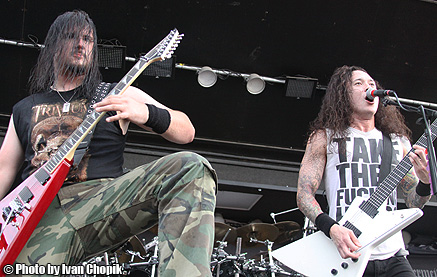
Corey Beaulieu and Matt Heafy
We went out, it should have been the worst show ever of our lives and ended our band right then and there, but it ended up being the biggest and best show we ever did. At eleven AM 40,000 people showed up to watch us. We didn’t suck at all, and since that show we sold out every UK headlining tour we did, Ascendancy then went silver and then gold, The Crusade went silver, and then we did two compilations that went gold.
So that was the biggest show of our lives until we did the 2009 Download Festival, which was just a little while ago, where we headlined the second stage. We were the last band on, and on at the same time as Def Leppard, and we had 40,000 people watching us again. They were all there just to see us this time. Because if you don’t want to see the last band, then you just leave, but those people stayed, and that was the best show of my life – and this has been the best tour of my life. This and Slipknot are tied for best tours. But that was still the best show. I don’t think you could top, until it happens everywhere else in the world, 40,000 people there to see your band. It doesn’t get any better than that.
IC: From what I understand, after Mayhem Fest this summer you have a few more tours lined up in support of Shogun.
MH: We’re home for a month after this, and then we do our first leg, which is Trivium, Whitechapel, Darkest Hour and Dirge Within. We’re playing all the secondary tertiary markets across North America – that’s including Canada. Then we’ve got two weeks off, and then we play all of the major markets across the U.S. and Canada with Trivium, Chimera, Whitechapel and Dirge Within. So we’ve got two gigantic headlining tours after this, because we’ve only done one headlining tour of the U.S. – we’ve done one co-headlining tour, but we’ve done countless numbers of headlining tours across the world. So we just want to capitalize on coming off of two of the biggest tours we’ve ever done in North America – that’s Slipknot and Mayhem, and come out and do our own thing, and bring people who only got to see us for 30-40 minutes, and have them come see a 90 minute set.
IC: For sure, man. I’m really digging the latest release Shogun right now. The guitar tones on it sound huge. What gear did you guys use for this album?
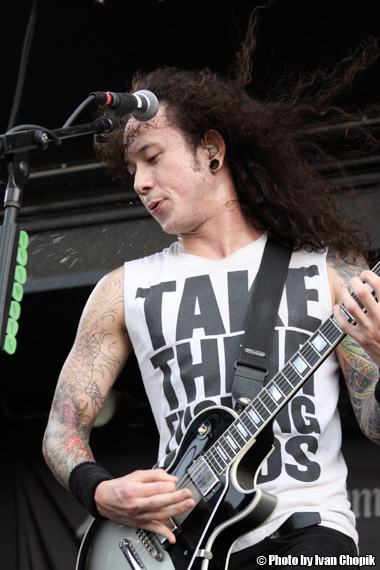
MH: I love talking about gear, by the way. I’m not with Dean anymore, but at the time, I was using this Dean MKH seven-string prototype that we made with my custom pickups and this custom guitar. We had really thick-ass strings. I believe in B standard, for the seven-string, we were using .13 to .68s, something ridiculous for standard tuning, because we knew it would sound thicker, and with Jazz 3 picks.
We went into a triple-splitting box. The first signal went into one specific kind of overdrive into a Peavey head, I believe it was a 5152, and then into a classic Marshall cab with two mics on top of that. The second signal was another overdrive from a different brand, probably an MXR OD, going into a Peavey 6505+, then into a Marshall White Tolex classic cab with two mics on top of that. I might be getting some of the details off wrong, but you get the general idea.
The next one was another overdrive pedal going into a classic Orange head into what I believe was a Mesa cab. So basically we had three different overdrives, three different heads, three different cabs and six different mics, and that was one guitar sound. That was one guitar sound a side – that wasn’t a split channel or anything, so all of that into one tone. So we did two of those, versus doing the normal four.
Normally what we did on our previous records, we’d do a DI, send it off to our mixer, they’d re-amp it, and we would have one guitar through one head on this side, one guitar through one head, one guitar through one head… four and four. But this time it’s the massive sound on each side, and then the middle guy that would show up every once in a while, and then a couple of overdubs that’ll show up somewhere else.
IC: There’s a track on this album that’s got almost a dance melody coming in right at the beginning – ‘Torn Between Scylla And Charybdis.’ You start with a melody, then another comes in that’s doing either a harmony or an octave up and harmony. Did you use a Whammy pedal for that, or did you use a capo? You’d obviously have to do some serious shifting around otherwise.
MH: It was a three-part harmony – some of them do octave notes. We had the first one, and then we had the harmony, and then we did a third harmony of the original. I think we had a human capo on that one. Our engineer, Ben [Terry,] he held down the twelfth fret so it was even an octave higher than that, because we have 24 frets on there.
IC: Have you guys been working on new material at all?
MH: We’ve got a few songs collectively written between the four of us right now. After those two U.S. and Canada tours finish up, we’ve got all of January off, then Asia, Australia, UK and Europe – all headlining. Then we’ll start our next record. And we’re hoping to have three months to work as a band, and then maybe jump out and do some festivals, and another three months to record the thing. We want Nick Raskulinecz [Shogun’s producer] on it again, for sure.
IC: Do you have any idea what direction the album will take compared to Shogun?
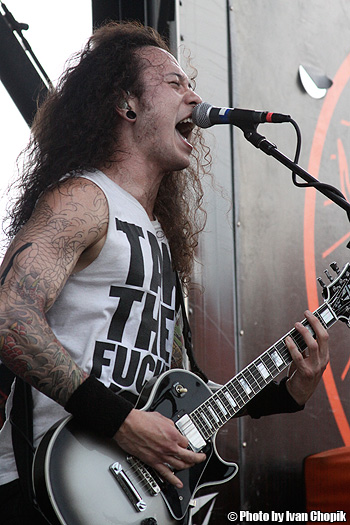
MH: With every previous Trivium record we’ve ever done, it’s made a jump from here to here. Obviously, the jump from The Crusade to Shogun was a little bigger than usual, but when it comes to this next record we want this jump to be worth about ten albums. We don’t want it to be standard old thing we keep doing. Every record we do is diverse, every record we do we feel is better or progressing in a more productive general direction, but what we want to have is a twenty or ten step jump that completely blows away everything we’ve ever done.
We don’t want to do the same old thing we do, because it’s not worth it to us, or to our fans. So basically, we want to find what that Trivium sound and style is, and write the best possible songs that can be understood by any kind of person in the world, whether you like metal or not, whether you speak English or not – universally translatable Trivium.
IC: I’ve seen in previous interviews where you listed all of your influences in five seconds, having answered the question so many times – but have your influences changed at all over the last few years?
MH: They change every couple of days, I think – what I like. Obviously, the four of us, we’ve got our favorites that everyone knows of, the classic metal bands. After I got into traditional metal, I got into melodic death metal very heavily for a while, I got into death metal for a little bit, I was in a black metal band when I was 16 – corpse paint wearing and all. I got out of that, I got into some of the late 90’s/early 2000’s era hardcore and metalcore bands when I was in high school.
When we were doing The Crusade, I got into Queen for the first time. I’d never really heard a full Queen song before then. I got into Queen, and I was into Kelly Clarkson a little bit – that was kind of my side listening. When we did Shogun I was heavily into The Beatles. Nowadays, pretty much all I ever listen to is Depeche Mode and classical music. And Depeche Mode, I gotta say, is… God, they’re fucking amazing. I recommend buying every single album, if anyone doesn’t have it, starting with Violator and working your way around that.
IC: Now for a little something different – tell me something about yourself that you’ve never mentioned before in an interview.
MH: I think we’ve done them all, man. We did an interview with Bizarre Magazine where I was talking about this horrible shit dream I had, and I told you about the cocaine thing from Download. We talked about the groupie shit from the first couple of things we ever did. I don’t know what else there is to tell. All right, here’s one that no one knew – I just saw Ferris Bueller’s Day Off for the first time ever two days ago.
IC: Did you like it?
MH: It was fuckin’ awesome. Well, my thing is that I don’t really like old movies because of the film quality and the sound quality, because I’m an audiophile – it has to be the best sound, it has to be the best picture, it has to be Blu-ray 1080p. But it was really good, so maybe I’ll give old movies a chance now.
IC: Is there any advice that you could give to upcoming bands? Being in your early twenties yourself, you’re able to offer a very current perspective to new bands coming up in this generation.
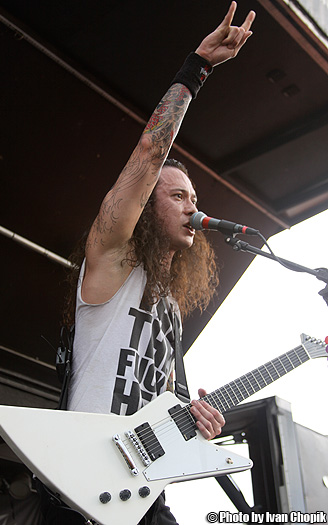 MH: My advice to bands to all of the bands that are coming up now… definitely practice you ass off individually, whether you’re a singer, or a guitar player, or a drummer or a keyboard player – whatever you are, you need to practice. You also need to practice your songwriting skills. I believe nowadays that songwriting is like an instrument, and the more songs you write, the better you’re gonna get at it. Whenever kids ask me at our signing or someone meets me ‘Dude, I’m in a band. What do I do to get big?’ it’s like, ‘Dude, you have to be a better live band than everyone else around you. You have to connect to people better than everyone else around you. You’ve just gotta be the best you can be in your hometown, and just really slam it.’
MH: My advice to bands to all of the bands that are coming up now… definitely practice you ass off individually, whether you’re a singer, or a guitar player, or a drummer or a keyboard player – whatever you are, you need to practice. You also need to practice your songwriting skills. I believe nowadays that songwriting is like an instrument, and the more songs you write, the better you’re gonna get at it. Whenever kids ask me at our signing or someone meets me ‘Dude, I’m in a band. What do I do to get big?’ it’s like, ‘Dude, you have to be a better live band than everyone else around you. You have to connect to people better than everyone else around you. You’ve just gotta be the best you can be in your hometown, and just really slam it.’
And you’ve gotta make songs, man. It’s not about who’s got the toughest beatdown part, who’s got the craziest solo – it’s all about the song that can be loved by people other than yourselves and your band. So you can go and make stuff that connects with people that is true to yourself.
So you’ve gotta find what your sound is, which is something we’re still looking for. We just finished our fourth record, and we’re still getting closer to what our sound is. Some bands, like Slipknot, find it right on their big breakthrough record. For us, we keep developing. So you’ve just gotta keep hammering at it. It takes a while, man. This took us ten years to be where we are now.
IC: Going back, is there anything you would have done differently to enhance your career?
MH: No. Ahh, let me think. There are definitely things, but I think that it’s better that things happened the way they did. I wish we could have had more time to do The Crusade. We didn’t have enough time to write it and record it, and that’s why it’s pretty stripped-down and raw. However, us doing it that way allowed us to learn from it, and allowed us to know what we need to do differently the next time. I’m not knocking that record by any means. I love that CD – [although] it is my least favorite Trivium album. But every fuckup we’ve ever done I think is integral to the way we ended up the way we are now, and every single thing that’s ever happened to us. And I’m sure more shitty stuff is gonna happen to us, and we’re gonna fuck up more. But it’s good, because people need to fuck up, and people need to eat shit, and live like shit to get somewhere and appreciate where they are.



